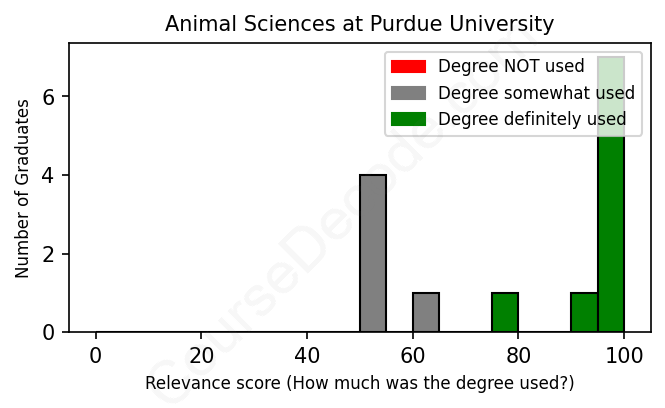
First, some facts. Of the Animal Sciences graduates from Purdue University we've analyzed , here's how many have used (or NOT used) their degree in their career:

These are estimates based on AI analysis of 14 LinkedIn profiles (see below).
The verdict? Significantly above average. Overall, with an average relevance score of 80%, Animal Sciences graduates from Purdue University have a much higher likelihood (+13%) of finding work in this field compared to the average graduate across all fields:
And for comparison, here's the chart for all profiles we've looked at across all degrees.
Also, after graduating, 35% of these graduates have pursued further education other than another Bachelor's degree (such as a Masters degree or other), which is right in line with the average across all fields.
See the details:
|
Relevance score: 50% We think this person has gone into a career only somewhat relevant to their degree. We think this person has gone into a career only somewhat relevant to their degree.
DEGREE INFOGraduated in 2014 from Purdue University with a Bachelor of Science (B.S.) in Animal Sciences. No other secondary education since. JOB HISTORY SINCE GRADUATIONOperations Management Trainee CGB Enterprises, Inc. Jun 2015 - Present ABOUTNo information provided. |
The top 10 most common jobs done by the graduates we've analyzed (ranked most common to least) are:
From analyzing the LinkedIn profiles of Purdue University graduates in Animal Sciences, it's clear that many have gravitated towards jobs that align quite closely with their degree. A significant number have pursued roles directly in veterinary care—like being Veterinary Assistants or Associate Veterinarians—which fully utilize the skills and knowledge they acquired during their studies. Other common positions include research-related roles, such as Graduate Research Assistants and Technicians, where graduates apply their expertise in animal welfare and health science. These roles seem to make good use of the academic foundation provided by their degree, especially for those engaged in animal-focused research.
However, not all jobs reflect such a strong relevance to Animal Sciences. Some graduates have ended up in positions like sales or operations management that don't call for specialized animal science knowledge, even though they might involve some indirect application of agricultural concepts. Consequently, while many graduates have found careers closely aligned to their studies—especially in veterinary and research fields—there is a notable portion whose roles are less focused on animal sciences, highlighting some variability in how this degree translates into job opportunities. Ultimately, it seems like the degree sets a solid foundation for those wanting to dive deep into animal-related careers, but there are also career paths that wander quite far from that focus.
Here is a visual representation of the most common words in job titles for Animal Sciences graduates (this is across all Animal Sciences graduates we've analyzed, not just those who went to Purdue University):

Looking at the career paths of Purdue University graduates with degrees in Animal Sciences, it seems like they generally start off strong, often landing jobs that are relevant to their field soon after graduation. Many of the first jobs include research assistant positions, veterinary roles, and positions in animal product sales, which indicates a solid initial alignment with their studies. For instance, graduates from 2011 found roles as veterinary assistants and sales support representatives in agricultural companies, while those from 2016 held various internships and externships that directly relate to animal care and research.
As these graduates progress in their careers, there's a noticeable trend towards specialized roles. In about five years, many are moving into more advanced positions, such as associate veterinarians and research associates. For example, a 2011 graduate transitioned from being a veterinary assistant to an associate veterinarian within just a few years. However, it’s also evident that some graduates veer off into areas that aren't directly related to Animal Sciences—like bartending or roles in companies like Covance that focus more on laboratory work than animal care. Overall, while many Purdue Animal Sciences graduates do find relevant and fulfilling careers, there are a significant number who seem to end up in fields that might not fully utilize their specialized degree. So, it's a mixed bag, with plenty of opportunity but also some unexpected turns along the way.
Getting a Bachelor’s degree in Animal Sciences at Purdue University can be a bit challenging, but it’s definitely manageable if you’re passionate about animals and willing to put in the effort. The coursework typically involves a mix of biology, animal nutrition, genetics, and hands-on labs, which can be tough if you’re not super into science. But hey, if you love working with animals and enjoy learning about their care and behavior, you might find it pretty rewarding. It’s not the easiest degree out there, but it's not impossibly hard either—basically, if you stay organized, ask for help when you need it, and study consistently, you should do just fine!
Most commonly, in the LinkedIn profiles we've looked at, it takes people 4 years to finish a Bachelor degree in Animal Sciences.
From the looks of it, these Purdue Animal Sciences grads have had a mixed bag when it comes to making decent money. Some have climbed the ladder in research and sales roles, especially in companies like Corteva and various veterinary positions, suggesting they might be doing pretty well, especially considering the stability of those jobs. On the flip side, some of the earlier jobs like veterinary assistants and interns generally don’t pay much, and it could take a while for those in research or vet roles to get to higher pay brackets. Overall, if they stick with their careers and keep gaining experience, they could definitely earn a comfortable living, but they might not be raking it in right off the bat.
Here is a visual representation of the most common words seen in the "about" section of LinkedIn profiles who have a Bachelor degree in Animal Sciences (this is across all Animal Sciences graduates we've analyzed, not just those who went to Purdue University). This may or may not be useful:

Here are all colleges offering a Bachelor degree in Animal Sciences (ordered by the average relevance score of their Animal Sciences graduates, best to worst) where we have analyzed at least 10 of their graduates:
| College | Score | Count |
|---|---|---|
 Purdue University Purdue University
|
80 | 14 |
 California State Polytechnic University-Pomona California State Polytechnic University-Pomona
|
78 | 13 |
 North Carolina State University North Carolina State University
|
77 | 18 |
 Iowa State University Iowa State University
|
75 | 25 |
 University of Missouri-Columbia University of Missouri-Columbia
|
75 | 12 |
 South Dakota State University South Dakota State University
|
73 | 10 |
 The Ohio State University The Ohio State University
|
71 | 21 |
 University of Florida University of Florida
|
68 | 15 |
 University of Vermont University of Vermont
|
68 | 12 |
 Michigan State University Michigan State University
|
67 | 20 |
 University of California, Davis University of California, Davis
|
66 | 27 |
 University of Illinois at Urbana-Champaign University of Illinois at Urbana-Champaign
|
63 | 16 |
 University of Tennessee, Knoxville University of Tennessee, Knoxville
|
61 | 13 |
 University of Arkansas University of Arkansas
|
60 | 10 |
 California Polytechnic State University-San Luis Obispo California Polytechnic State University-San Luis Obispo
|
59 | 22 |
 University of Wisconsin-River Falls University of Wisconsin-River Falls
|
58 | 10 |
 Texas A&M University Texas A&M University
|
54 | 34 |
 Penn State University Penn State University
|
53 | 14 |
 Texas Tech University Texas Tech University
|
51 | 12 |
 Kansas State University Kansas State University
|
51 | 22 |
 Oklahoma State University Oklahoma State University
|
43 | 16 |